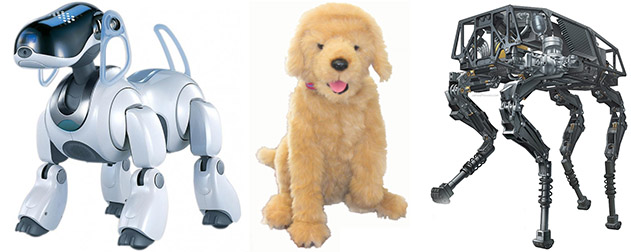
Sources: Sony, Sega, Google
We may not yet be living in a world where robots mix with us every day, but at least one researcher thinks that day is not far off when it comes to pets. According to Jean-Loup Rault, an animal welfare researcher from the University of Melbourne in Australia, artificial animals consisting of chips and circuits that mimic real-life animals may replace actual animals as pets in the next few years.
He said, “It might sound surreal for us to have robotic or virtual pets, but it could be totally normal for the next generation. It’s not a question of centuries from now. If 10 billion human beings live on the planet in 2050 as predicted, it’s likely to occur sooner than we think. If you’d described Facebook to someone 20 years ago, they’d think you were crazy. But we are already seeing people form strong emotional bonds with robot dogs in Japan.”
According to Rault part of what may drive the trend towards robot pets is the lack of space and the high cost of living that are anticipated in cities of the future. “Pets may become a luxury possession for people who can afford to sustain their cost and fulfill their needs in terms of space.”
Coming back to the present day, Rault says, “Pet robotics has come a long way from the Tamagotchi craze of the mid-90s. In Japan, people are becoming so attached to their robot dogs that they hold funerals for them when the circuits die.” He is referring there to the AIBO robot dogs offered by Sony starting in 1999. Sony discontinued making the product in 2006 and stopped support for them in 2014.
The research was undertaken when Rault realised that there was not enough information on how our relationships with animals may be affected by technology. According to him, there isn’t much research data on pet robotics available. However, there are abundant patents on robotic dogs, implying that there is an anticipation for the need of such pets in the near future.
Unlike mobile phones or tablets, where the interaction is purely for entertainment, having a robot pet encourages an emotional connection and attachment. Could this pose an ethical dilemma? How healthy is it to forego real companionship, duty and effort and knowingly replace it with a manmade device?
Rault says that while these robopets could benefit those allergic to pets, short on space, in hospital, or scared of real animals, depending on a robot for company does pose big ethical questions. He said, “Robots can, without a doubt, trigger human emotions. If artificial pets can produce the same benefits we get from live pets, does that mean that our emotional bond with animals is really just an image that we project on to our pets?”
The research also brings up other interesting questions. For example, Rault is interested in whether a society that accepts fake pets could lead to a shift in how real animals are treated. “Of course we care about live animals, but if we become used to a robotic companion that doesn’t need food, water or exercise, perhaps it will change how humans care about other living beings.”
Share your thoughts, leave a comment below. Please like FamiLife’s page on Facebook so that you get all our articles and others may find us.
Rault’s article was published in the May 2015 edition of Frontiers in Veterinary Science.
